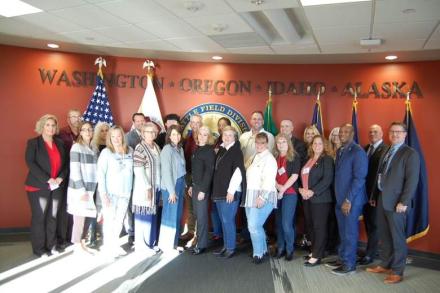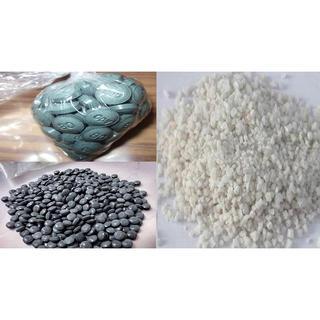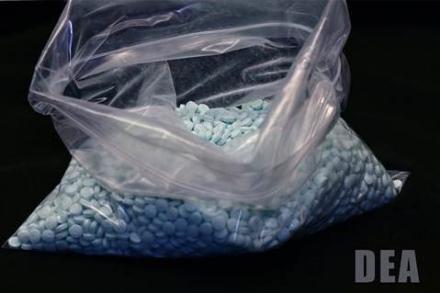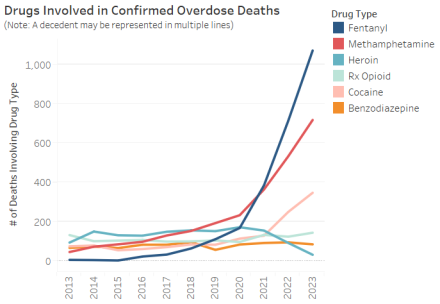Seattle

I am David Reames, Special Agent in Charge of the DEA Seattle Field Division, and I’d like to welcome you to Operation Engage Seattle. There are far too many fentanyl poisonings and overdoses affecting our communities, and sadly these numbers are increasing. In King County, in 2023, more than 1,067 people died from fentanyl poisonings and overdoses; that’s a 47 percent increase from 2022 when 714 people died.
The DEA laboratory tests the pills we seize and currently 5 out of 10 fake pills laced with fentanyl contain a potentially lethal dose. In 2022, more than 107,000 Americans died from drug overdoses in the United States, according to the Centers for Disease Control and Prevention (CDC), and more than two-thirds (68%) of those deaths involved synthetic opioids, mostly fentanyl.
In 2023, the DEA Seattle Field Division removed an estimated 11.6 million fatal doses of fentanyl. The Sinaloa Cartel and Cartel Jalisco New Generation (CJNG) are responsible for distributing death in the form of fentanyl in the Pacific Northwest. DEA will not stop pursuing these criminal drug networks and bringing them to justice. The DEA remains focused on public health and safety and saving lives, a mission that includes both drug enforcement as well as a robust effort to reduce the demand for fentanyl, especially among our youth. This demand reduction effort is Operation Engage, and our division will focus on the Greater Seattle Area this year.
DEA’s Operation Engage is a comprehensive, community-level, collaborative approach focusing on reducing drug poisonings and saving lives through continuing drug education and awareness, prevention curriculum, online resources, school programs, and many other special events.
Other components of Operation Engage Seattle include:
- Stakeholder/Community Gatherings: To share the latest information about drug trends, drug threats, and other related, pertinent information.
- The DEA Citizens Academy: DEA recognizes the importance of forging strong alliances with local communities and maintaining collaborative relationships with community leaders. DEA’s Citizens Academy offers participants the opportunity to understand the world of federal drug law enforcement and the important role DEA and the community play together in combating drug trafficking, drug misuse, and related violence.
- Youth Engagement: Through after-school and summer programs, in collaboration with the DEA Educational Foundation, children of all ages will be able to actively participate in age-appropriate activities, designed for them to learn and gain the most knowledge about the dangers of drugs in a fun way.
- Community Outreach Programs: DEA, along with stakeholders, will concentrate efforts in the communities most affected by opioid misuse. In those targeted communities, the Seattle Field Division will participate in facilitating prevention strategies to include, but not limited to, drug prevention training and technical assistance for communities, coalition outreach, and prescription drug take back events.
These are only a few of the many resources and opportunities we have available to share with our communities.
I invite you, and your families, to explore our Operation Engage webpage to learn about the many resources we have available. Learning as a family, early on, is the first step in avoiding drug experimentation, drug misuse, drug addiction, and all related behaviors that are plaguing our communities.
We are stronger together.
Always at your service,
SAC David Reames

Drug Information
What is Fentanyl?
Fentanyl is a synthetic opioid that is 80-100 times stronger than morphine. Pharmaceutical fentanyl was developed for pain management treatment of cancer patients, applied in a patch on the skin. Because of its powerful opioid properties, fentanyl is also diverted for abuse.
Fentanyl is added to heroin to increase its potency, or be disguised as highly potent heroin.
Fake Pills
Many fake pills, created to look to legitimate prescription medication, contain dangerous and sometimes deadly amounts of fentanyl.
Check out our new factsheet to learn more about fake pills.
DEA Fentanyl Seizures in 2024

In 2024, DEA seized more than 55 million fentanyl-laced fake pills and more than 7,800 pounds of fentanyl powder. The 2024 seizures are equivalent to more than 367 million lethal doses of fentanyl.
One Pill Can Kill

The Drug Enforcement Administration warns the American public of the alarming increase in the lethality and availability of fake prescription pills containing fentanyl and methamphetamine. International and domestic criminal drug networks are mass-producing fake pills, falsely marketing them as legitimate prescription pills, and killing unsuspecting Americans.
These counterfeit pills are easy to purchase, widely available, and often contain deadly doses of fentanyl. Pills purchased outside of a licensed pharmacy are illegal, dangerous, and potentially lethal. This alert does not apply to legitimate pharmaceutical medications prescribed by medical professionals and dispensed by pharmacists. Read more.
See Related: Check out this Fake Pills factsheet.
Emerging Threat
Xylazine, reported as an adulterant in an increasing number of illicit drug mixtures, has also been detected in a growing number of overdose deaths. It is commonly encountered in combination with fentanyl but has also been detected in mixtures containing cocaine, heroin, and a variety of other drugs. However, xylazine is most frequently reported in combinations with two or more substances present. In addition to its presence in drug combinations, xylazine (often known as “tranq”) is used on its own, though this is less frequently reported. Limited scientific research has been conducted on the effects of xylazine on the human body, but anecdotal reports indicate that users experience effects similar to opioids. Xylazine can lead to depression of the central nervous system along with other adverse effects, as reported in scientific and medical journals; the presence of xylazine in illicit drug combinations and its detection in fatal overdoses may be more widespread than reported as a number of jurisdictions across the country may not include xylazine in forensic laboratory or toxicology testing.
Local Events
Partners
Addiction Help Finder
Our goal is to simplify the path to recovery from addiction by providing a comprehensive, easy-to-navigate website. We highlight addiction help resources in Spokane and surrounding areas, focusing on prevention, treatment, recovery, and support. Designed for all community members impacted by addiction, our platform serves as a centralized hub of information for individuals, loved ones, and healthcare professionals alike. Learn more.
NorthWest HIDTA
Created by Congress in 1988, the High Intensity Drug Trafficking Areas (HIDTA) Program coordinates and assists Federal, State, Local, and Tribal law enforcement agencies (LEAs) to address regional drug threats with the purpose of reducing drug trafficking and drug production in the United States. Learn more.
Rayce Rudeen Foundation
The Rayce Rudeen Foundation works with organizations and programs that encourage a healthy and productive life, free from addiction. Learn more.
Department of Justice: Office of Justice Programs (OJP)
www.ojp.gov
The Office of Justice Programs (OJP) provides innovative leadership to federal, state, local, and tribal justice systems, by disseminating state-of-the art knowledge and practices across America, and providing grants for the implementation of these crime fighting strategies. Because most of the responsibility for crime control and prevention falls to law enforcement
officers in states, cities, and neighborhoods, the federal government can be effective in these areas only to the extent that it can enter into partnerships with these officers.
Department of Health & Human Services (HHS): Substance Abuse Mental Health Services Administration (SAMHSA)
www.samhsa.gov
The Substance Abuse and Mental Health Services Administration (SAMHSA) is the agency within the U.S. Department of Health and Human Services that leads public health efforts to advance the behavioral health of the nation. SAMHSA's mission is to reduce the impact of substance abuse and mental illness on America's communities. SAMHSA promotes and implements prevention and early intervention strategies to reduce the impact of mental and substance use disorders in America’s communities.
Center for Substance Abuse Prevention (CSAP)
The mission of the Center for Substance Abuse Prevention is to improve behavioral health through evidence-based prevention approaches. Center for Substance Abuse Treatment
(CSAT)
The mission of the Center for Substance Abuse Treatment is to promote community-based substance abuse treatment and recovery services for individuals and families in every community. CSAT provides national leadership to improve access, reduce barriers, and promote high quality, effective treatment and recovery services.
Centers for Disease Control & Prevention (CDC)
www.cdc.gov
CDC remains committed to advancing a public health approach to preventing drug overdose death and applies its scientific expertise to help curb the epidemic in three ways: improving data quality and surveillance to monitor and respond to the epidemic; strengthening state efforts by scaling up effective public health interventions; and equipping health care providers with the data and tools needed to improve the safety of their patients.
Interagency Coordinating Committee on the Prevention of Underage Drinking (ICCPUD)
https://www.stopalcoholabuse.gov/
The federal Interagency Coordinating Committee on the Prevention of Underage Drinking (ICCPUD) works with state, territorial, and local governments and organizations to reduce and prevent underage drinking and its consequences. ICCPUD’s website, StopAlcoholAbuse.gov,
provides the latest research and resources to support underage drinking prevention and related issues.
National Institute on Drug Abuse for Teens
https://teens.drugabuse.gov/
The National Institute on Drug Abuse (NIDA) for Teens is a trusted source for science-based information on teen drug use and its effects. The website provides teens, teachers, and parents with information about the effects and consequences of drug use.
Substance Misuse Prevention Resources
Washington State Health Care Authority
The Health Care Authority (HCA) funds substance use disorder prevention programs statewide. It also provides oversight and support to local partners working to prevent substance use and to promote health and wellness in communities across the state. Learn more.
University of Washington
Discover treatment and recovery help resources promoted by the University of Washington's Addiction, Drug & Alcohol Institute (ADAI). Learn more.
StopOverdose.org
Stopoverdose.org is a project of the Center for Drug Safety and Services Education (CDSSE) at the University of Washington Addictions, Drug & Alcohol Institute (ADAI). CDSSE offers education and technical assistance for individuals, professionals, and communities in Washington State who want to learn to prevent and respond to overdose and improve the health of people who use drugs. Learn more.
King County
King County, Washington offers prevention services grants via its Alcohol and Other Drug Prevention Program and Community Organizing Program. Learn more.
Washington Teen Link
Speak confidentially with teen volunteers about drug and alcohol concerns, relationships, bullying, stress, depression, or any other problems you’re facing. Learn more.
Washington Poison Center
The Washington Poison Center is a 501(c)3 nonprofit organization serving the citizens of Washington state since 1956. The specialists in poison information answer more than 138,000 calls a year from Washingtonians related to poisoning and toxic exposures. Learn more.
Just Think Twice
The JustThinkTwice.com website aims to educate teens about the dangers of substance misuse.
Get Smart About Drugs
The GetSmartAboutDrugs.com website is geared to parents, caretakers, and educators. The site provides information and statistics about drug use.
One Pill Can Kill
The Drug Enforcement Administration has issued a Public Safety Alert warning Americans of the alarming increase in the lethality and availability of fake prescription pills containing fentanyl and methamphetamine.
DEA Take Back Day
DEA’s National Prescription Drug Take Back Day reflects DEA’s commitment to Americans’ safety and health, encouraging the public to remove unneeded medications from their homes as a measure of preventing medication misuse and opioid addiction from ever starting.
Together for Families
Families play a key role in preventing and responding to substance use. Too many families are grieving the death of a loved one due to substance use or coping with the stress that comes from loving a person affected by substance use or misuse. Fortunately, there are thousands of professionals and volunteers involved in all types of organizations who are in positions to help families help their loved one. The Drug Enforcement Administration is honored to partner with these organizations at the state, national and local level. Together for Families seeks to be a place where you can find information that helps you wherever you are on your journey.
Treatment
Find treatment in your area. Go to FindTreatment.gov to search for general drug treatment facilities in your area. On this site, you can find facilities that offer various payment options (including free and no-cost care), youth treatment facilities, special programs for Veterans, plus more.
Otherwise, enter your zipcode below to find substance abuse treatment facilities in your area.




